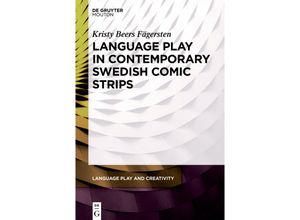This book focuses on the unexplored context of contemporary Swedish comic strips as sites of
innovative linguistic practices where humor is derived from language play and creativity
often drawing from English and other European languages as well as social and regional dialects
of Swedish. The overall purpose of the book is to highlight linguistic playfulness in Swedish
comic strips as an example of practices as yet unobserved and unaccounted for in theories of
linguistic humor as applied to comics scholarship. The book familiarizes the reader with the
Swedish language and linguistic culture as well as contemporary Swedish comic strips with
chapters focusing on specific strategies of language play and linguistic humor such as mocking
Swedish dialects and Swedish-accented foreign language usage invoking English language popular
culture swearing in multiple languages and turn-final code-switching to English to signal the
punchline. The book will appeal to readers interested in humor comics or how linguistic
innovation language play and language contact each can further the modern development of
language exemplified by the case of Swedish.



